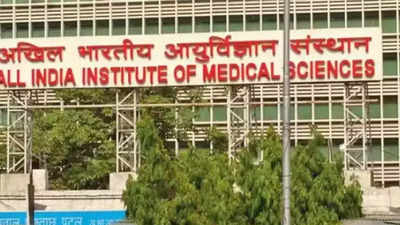Top Searches
- News
- City News
- delhi News
- First time at AIIMS Delhi: Spinal surgery, discharge in a day
First time at AIIMS Delhi: Spinal surgery, discharge in a day

The goal of having surgeries using targeted anaesthesia is not simply to have the patients awake during the surgery, but to discharge them in a day
NEW DELHI: AIIMS has become the first medical institute in south Asia to carry out a surgical procedure with the patient fully conscious and unanaesthetised and being discharged within a day, as in an outpatient department.
In the past month, the spinal surgery team led by professor Rajesh Malhotra and the anaesthesia team under Dr Puneet Khanna planned and executed four ‘ambulatory’ spinal fusion surgeries in which the patients remained awake throughout the procedure and were allowed to leave on the same day of the surgery.
The first case was that of a 40-year-old female patient. “There was a slippage of the vertebra. Normally, we do it under general anaesthesia, but in this particular case we gave injections in the spine and using a special ultrasound guided thoracolumbar interfascial plane (TLIP) block and advanced surgical techniques to anaesthetise the specific area of surgery,” disclosed Dr Bhavuk Garg, orthopaedics professor.
The patient was monitored for four hours after the procedure until the effects of the spinal anaesthesia wore off. She was then discharged the same day on oral medication.
The goal of having surgeries using targeted anaesthesia is not simply to have the patients awake during the surgery, but to discharge them in a day. In government hospitals, where the patient rush is huge, this technique can help reduce the load of bed occupation.
“In the western world, this process is used to reduce the cost of medical expenditure but in India, we resort to it to maximise resource potential,” said Garg. “This is how we are reducing the long waiting list. Besides conscious surgery, the ortho surgery department has also been the first to start day-care service for total knee replacement or hip replacement. Now, we are working on effective anaesthesia techniques and post-operative medications such as ERAS (enhanced recovery after surgery).”
Dr Rajesh Malhotra, orthopaedic surgeon and head of the AIIMS trauma centre, remarked that ‘day-care surgery’ entailed a variety of mental and physical benefits for the patient. One wouldn’t have to go through the hassle of staying in a monitored environment of the hospital after the surgery in this case.
“AIIMS has been tirelessly working for the betterment of a patient’s surgical experience,” Malhotra said. “While the benefit of increased patient satisfaction scores undoubtedly indicates the necessity of this, it also carries with it the unseen advantage of reducing per patient costs to the hospital, hence the government. An early discharge decreases the need for antibiotics and dependence on hospitals while reducing incidence of infections.”
In the past month, the spinal surgery team led by professor Rajesh Malhotra and the anaesthesia team under Dr Puneet Khanna planned and executed four ‘ambulatory’ spinal fusion surgeries in which the patients remained awake throughout the procedure and were allowed to leave on the same day of the surgery.
The first case was that of a 40-year-old female patient. “There was a slippage of the vertebra. Normally, we do it under general anaesthesia, but in this particular case we gave injections in the spine and using a special ultrasound guided thoracolumbar interfascial plane (TLIP) block and advanced surgical techniques to anaesthetise the specific area of surgery,” disclosed Dr Bhavuk Garg, orthopaedics professor.
The patient was monitored for four hours after the procedure until the effects of the spinal anaesthesia wore off. She was then discharged the same day on oral medication.
The goal of having surgeries using targeted anaesthesia is not simply to have the patients awake during the surgery, but to discharge them in a day. In government hospitals, where the patient rush is huge, this technique can help reduce the load of bed occupation.
“In the western world, this process is used to reduce the cost of medical expenditure but in India, we resort to it to maximise resource potential,” said Garg. “This is how we are reducing the long waiting list. Besides conscious surgery, the ortho surgery department has also been the first to start day-care service for total knee replacement or hip replacement. Now, we are working on effective anaesthesia techniques and post-operative medications such as ERAS (enhanced recovery after surgery).”
Dr Rajesh Malhotra, orthopaedic surgeon and head of the AIIMS trauma centre, remarked that ‘day-care surgery’ entailed a variety of mental and physical benefits for the patient. One wouldn’t have to go through the hassle of staying in a monitored environment of the hospital after the surgery in this case.
“AIIMS has been tirelessly working for the betterment of a patient’s surgical experience,” Malhotra said. “While the benefit of increased patient satisfaction scores undoubtedly indicates the necessity of this, it also carries with it the unseen advantage of reducing per patient costs to the hospital, hence the government. An early discharge decreases the need for antibiotics and dependence on hospitals while reducing incidence of infections.”
FOLLOW US ON SOCIAL MEDIA
FacebookTwitterInstagramKOO APPYOUTUBE
Start a Conversation









